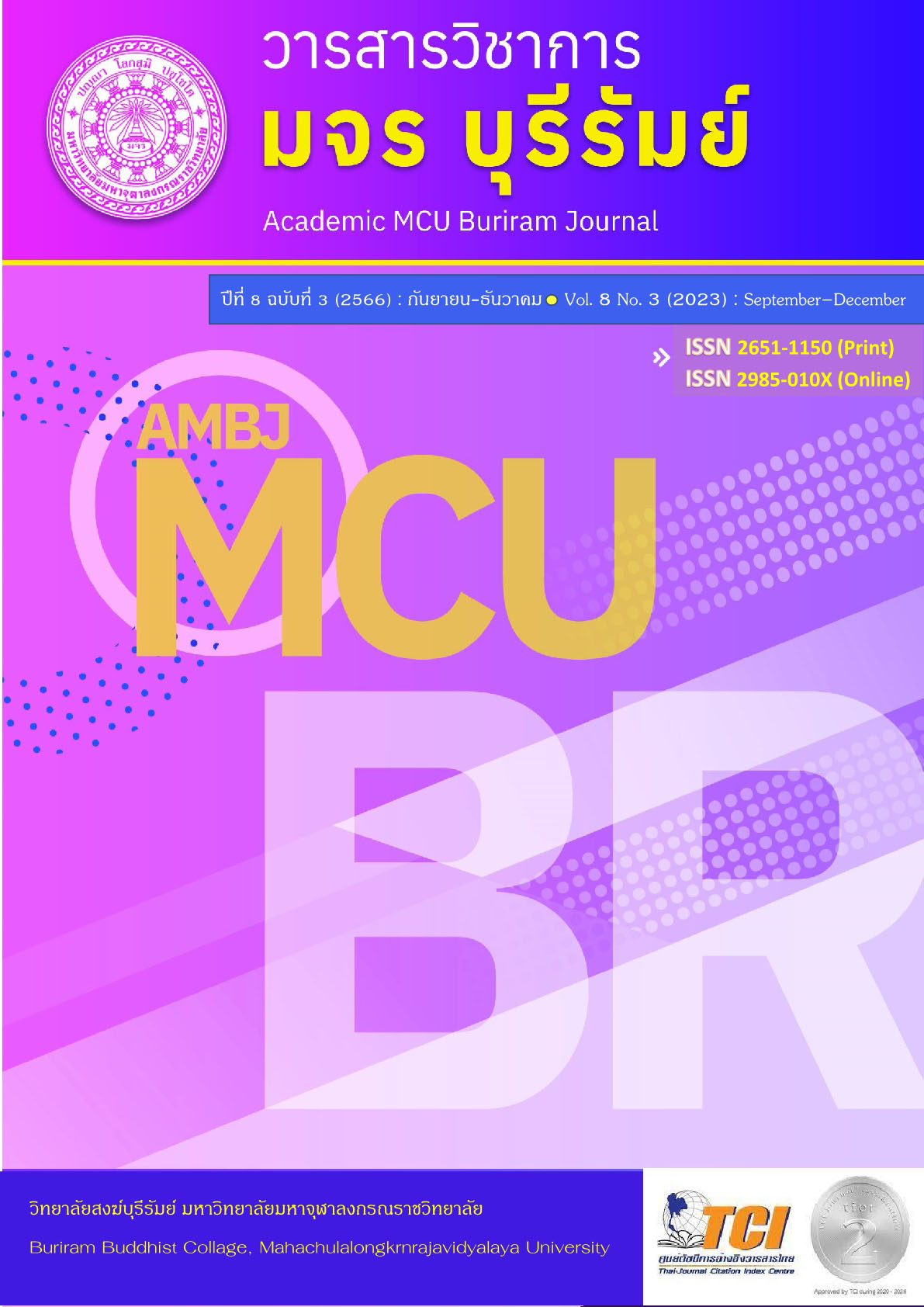Promotion of Citizenship Regarding the Principles of Dharma 6 of the People, Wang Hin Subdistrict Municipality, Wang Hin District, Sisaket Province
Keywords:
Promotion of Citizenship, Principles of Dharma 6, The PeopleAbstract
The purpose of this this were: 1) to study the level of citizenship promotion according to the principles of Dharma 6 of the people 2) to compare the opinions on the promotion of citizenship according to the principles of Dharma 6 of the people, classified by gender, age, educational level and occupation; and 3) to propose guidelines for promoting citizenship according to the principles of Dharma 6. The sample group consisted of 347 people aged 18 years and over who lived in the municipality's kiosk, Wang Hin Subdistrict, Wang Hin District, Sisaket Province. The instrument used for data collection was a 5-level estimation scale questionnaire. Content accuracy was 0.67-1.00 and confidence was .86.
The research result found that:
1. The overall level of the promotion of citizenship according to the principles of Dharma 6 of the people in Wang Hin Subdistrict Municipality, Wang Hin District, Sisaket Province is at the highest level. When considering each aspect in order from high to low averages were social, followed by economic. The aspect with the lowest average was politics and governance.
2. The results of comparison of the level of citizenship promotion according to the principles of Dharma 6 of the people of Wang Hin Sub-District Municipality, Wang Hin District, Sisaket Province classified by gender and economic aspects are significantly different at the .05 level. Other than that, there is no difference. When classified by age, there is no difference in politics and administration. The rest are statistically different at the .05 level. There is no difference in the classification by level of education. There is also no difference in the classification by level of education.
3. Based on the information obtained from open-ended questions, recommendations and guidelines for promoting citizenship according to the principles of Dharma 6 of the people can control their emotions and behavior to be normal when faced with problems or things that are dissatisfying. And people should have public spirit so that everyone in society can live together. Taking into account the benefits of the public as a whole This must drive the entire system, especially school-age children. Because volunteer work and public spirit are desirable characteristics that must be continuously cultivated.
References
ธานินทร์ ศิลป์จารุ. (2552). การวิจัยและวิเคราะห์ข้อมูลทางสถิติด้วย SPSS. พิมพ์ครั้งที่ 10. กรุงเทพฯ: บิสซิเนสอาร์แอนด์ดี.
พระชวลิต ปญฺญาวชิโร (แสงบุญเรือง). (2561). การพัฒนาพลเมืองเชิงพุทธบูรณาการของหมู่บ้านสามขา อำเภอแม่ทะ จังหวัดลำปาง. วิทยานิพนธ์ปริญญาพุทธศาสนามหาบัณฑิต. บัณฑิตวิทยาลัย: มหาวิทยาลัยมหาจุฬาลงกรณราชวิทยาลัย.
พัชรี ศิลารัตน์, พระอุดมเกียรติวิสุทฺธาจาโร, จิตรลดา ศิลารัตน์ และปิยะสุดา เพชราเวช. (2558). การส่งเสริมการเรียนรู้ประชาธิปไตยของเยาวชนในสถานศึกษาภาคตะวันออกเฉียงเหนือตอนกลางโดยใช้คารวธรรม สามัคคีธรรม ปัญญาธรรม. วารสารสถาบันวิจัยญาณสังวร, 8(2), 146-157.
บุญส่ง นาแสวง. (2563). การเสริมสร้างจิตสำนึกความเป็นพลเมืองดีของเยาวชนตามหลักพุทธธรรมของพระสอนศีลธรรม. สถาบันวิจัยพุทธศาสตร์: มหาวิทยาลัยมหาจุฬาลงกรณราชวิทยาลัย.
ปิ่น มุทุกันต์. (2535). มงคลชีวิต ภาค 3. กรุงเทพฯ: โรงพิมพ์มหามกุฎราชวิทยาลัย.
รัชเกล้า กองแก้ว. (2560). ความเป็นพลเมืองไทย : แนวคิดพื้นฐานในการขับเคลื่อนสังคม. กรุงเทพฯ: สถาบันวิชาการครองกันประเทศ.
รัชตา คำเสมานันทน์. (2562). การมีส่วนร่วมในการส่งเสริมความเป็นพลเมืองของกรรมการศูนย์ส่งเสริมพัฒนาประชาธิปไตยตำบลในเขตภาคเหนือตอนบนของประเทศไทย. วารสารสหวิทยาการวิจัยและวิชาการ, 3 (2), 659-674.
Krejcie, R. V., & Morgan, D. W. (1970). Determining sample size for research activities. Educational and Psychological Measurement, 30(3), 607–610.
Downloads
Published
How to Cite
Issue
Section
License
Copyright (c) 2023 Academic MCU Buriram Journal

This work is licensed under a Creative Commons Attribution-NonCommercial-NoDerivatives 4.0 International License.
ทัศนะและความคิดเห็นที่ปรากฏในบทความวารสารฉบับนี้ถือเป็นความรับผิดชอบของผู้เขียนบทความนั้น ไม่ถือเป็นทัศนะและความรับผิดชอบของบรรณาธิการ





